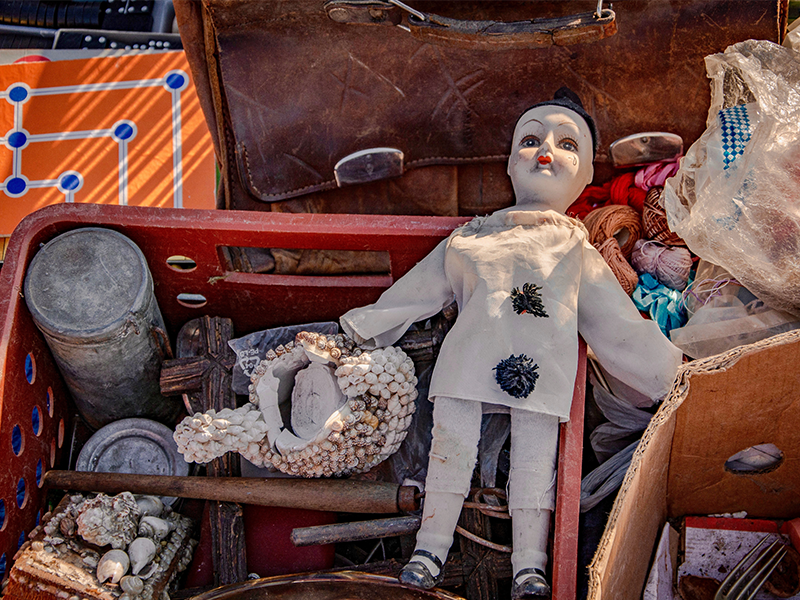Is Hoarding Genetic?

As mental and emotional disorders go, hoarding disorder is the one disorder that many psychologists and therapists find to be the most perplexing. The simple truth is not a lot of research information exists regarding hoarding and the causes of this troubling disorder. Even the information that does exist tends to be inconclusive.
The following information is going to focus on the possible connection between genetics and hoarding. In other words, the focus will seek to answer the question, “Is hoarding hereditary?”
Possible Causes of Hoarding Disorder
Before looking at the possible connection between genetics and hoarding, it seems prudent to first discuss a fuller range of possible causes. This kind of information should be very helpful to someone who might be a hoarder or to someone who suspects a loved one might have a hoarding disorder.
By definition, hoarding disorder exists when someone has difficulty throwing away or parting with objects that seemingly have no intrinsic value to anyone but the hoarder. They continue to accumulate their item or items of choice because the thought of getting rid of them causes them great emotional/mental distress.
Aside from emotional/mental distress, hoarding has the potential to cause other life problems like:
- Household clutter that creates physical and health problems
- Problems in relationships with family and friends
- Legal issues with landlords and or neighbors
- Invitation for pest to infest cluttered areas
- Loneliness and social isolation
- Problems at work or school because of being distracted and the inability to be organized
Clearly, this list of potential problems serves as an indication that something is going horribly wrong. This would lead a reasonable person to ask about the causes of hoarding disorder.
Admittedly, hoarding disorder is a mystery in terms of causation. With that said, researchers have been able to determine there seems to be four possible culprits or risk factors. Let’s take a look at all four.
Emotional/Mental Status
Seldom does an individual suffer from one disorder without the presence of another disorder somewhere in their psyche. In the case of hoarding disorder, there is often the existence of anxiety and or depression that seems to drive the individual’s need to hoard things. The combination of such disorders often results in issues with things like paying attention, organization, and problem-solving.
Stress Brought on by Life Events
In a lot of cases, hoarding is a by-product of stressful life experiences that the hoarder has survived. The list of life events that could drive someone to hoard includes
- Physical, emotional, mental, or sexual abuse
- Living in extreme poverty
- The loss of important possessions due to natural disasters such as tornado, flooding, or earthquake
- Fire loss
- Loss of a beloved family member due to death or even divorce
Family history
Family history does not refer to genetics. It refers to the possibility that someone has been exposed to hoarding by a family member or close friend who likely had a hoarding disorder whether they recognized it or not. The hoarding exposure might have resulted in some level of acceptance regarding the obsessive collection of worthless stuff. This like answers the basic question, “Does hoarding run in families?”
Genetics
Is hoarding genetic? To eliminate the suspense any further, there does seem to be a connection between genetics and hoarding. The feeling here is that discussing the matter is deserving of a dedicated topic section.
What Items Hoarders Tend to Hoard

Before getting into the genetics of hoarding disorder, it makes sense to first describe the types of things to which hoarders tend to cling. Reminder: the things hoarders collect usually have no value beyond sentimental value, making them look like trash to outsiders. Here is a list of common hoarding targets:
- Old newspapers and magazines
- Broken or damages small appliances
- Canned or packaged food
- Old bottles, bottle caps, and cans
- Old clothing and hangers
- Tattered used books
- Pets like cats or dogs
The Genetics of Hoarding
It seems prudent to make sure the following information is easy to follow and understand. It’s being directed at laypersons like you, people who have legitimate concerns about their hoarding behavior or the hoarding behavior of loved ones. With that in mind, there will be a conscious effort made not to get too scientific.
There is evidence that strongly suggests there is a connection between genetics and some obsessive-compulsive disorders (OCD). There is also some evidence that strongly suggests that some severe levels of hoarding disorder should be classified as an obsessive-compulsive disorder. By extrapolation, it would be fair to say that there is a genetic connection to hoarding disorder.
Note: It’s important to note that most cases of hoarding are not classified under the obsessive-compulsive disorder heading. They actually fall into a separate disorder category. It’s only the most severe hoarding disorder cases that fall into the OCD category.
Keeping in mind that very little about hoarding and genetics is conclusive, there is enough scientific evidence to warrant consideration.
Over the last few years, researchers have seen an issue with chromosome 14 that seems to exist in people who have a legitimate hoarding disorder. The sample size of these studies is small, but the resulting evidence consistently exists over at least three studies. Two of the studies came out of Johns Hopkins University School of Medicine and the University of California, San Diego, respectively.
Based on the evidence collected to date, researchers are coming to believe some portion of hoarding disorder could be hereditary in some individuals. It’s enough to warrant further studies that are ongoing throughout the world. A definitive answer to “is hoarding genetic?” might be on the horizon.
Is It Possible You Have a Hoarding Disorder?
The fact you are reading this information suggests hoarding has had some effect on your life. If that’s the case, knowing the symptoms of hoarding disorder might benefit you. With that in mind, here are some of the most common symptoms:
- Too much useless stuff accumulating in the house
- Refusal to throw away certain items
- Clutter prevents movement throughout the home
- Feelings of anxiety and stress at the thought of parting with stuff
- Indecisiveness
- Problems with planning and organizing
- Pest problems among trash
Clutter Trucker is Here to Help
As one of the leading junk removal companies in the Denver area, we have had plenty of exposure to customers who have been diagnosed as hoarders. Based on this exposure, we have trained our employees to have great empathy and compassion towards said customers.

For the benefit of our customers who need help cleaning up problems related to hoarding, we provide clean-up services like:
- Junk and trash removal
- Cleaning of adjacent areas
- Help with organizing formerly cluttered areas
As part of our clean-up services, we are more than willing to sit with hoarders and explain the clean-up process and how it will ultimately benefit their recovery from hoarding disorder. We listen to their comments and questions and give advice and answers whenever possible. Our ultimate goal is to make the “letting go” process as painless for our hoarding customers as possible.
When you or a family member are ready for change and need help cleaning up clutter, please give us a call right away. We’ll answer the call with quality and affordable junk removal services.
Give us a call for a quote and to schedule an appointment

About Jennifer Hanzlick
Clutter Trucker is a Denver-based hoarding clean-out company founded by Jennifer Hanzlick. Jennifer leveraged 15 years of corporate experience in to start the company in 2008. Her mission is to help and educate individuals and their loved ones who have hoarding disorder. A featured speaker at Ted X Boulder, Jennifer works directly with community and non-profit organizations to boost public awareness about the condition. To that end, she founded the Colorado Hoarding Task Force in 2015.
 720-982-7856
720-982-7856



